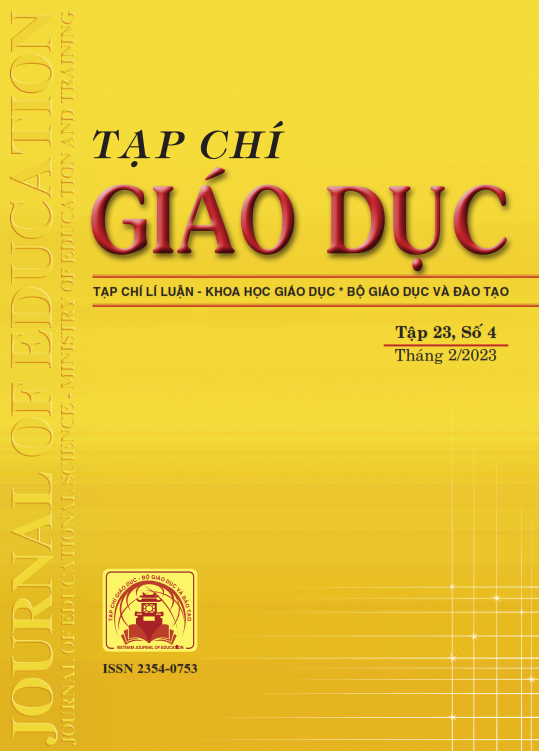Kiến thức nội dung toán để dạy học tích phân của giáo viên toán tương lai
Tóm tắt
In recent years, mathematics knowledge for teaching calculus has increasingly captured mathematics educators’ attention. However, in Vietnam, literature on this topic is still limited. This study examines prospective mathematics teachers’ content knowledge for teaching integral. The research instruments are the integral problems designed to measure general and specialized content knowledge based on the model of mathematical knowledge for teaching suggested by Ball et al. (2008). The data was analyzed quantitatively and qualitatively. The research results initially revealed the linear relationship between pre-service mathematics teachers’ general content knowledge and specialized content knowledge for teaching integral.
Tài liệu tham khảo
Ball, D. L., Thames, M. H., & Phelps, G. (2008). Content knowledge for teaching: What makes it special. Journal of Teacher Education, 59(5), 389-407.
Bullock, E. P., Webster, J. S., & Jones, D. L. (2021). Helpful and Hindering Features of GeoGebra: Understanding What Affords Conceptual Understandings of Definite Integrals Among Pre-Service Middle Grades Mathematics Teachers. International Journal for Technology in Mathematics Education, 28(2), 81-92.
Delice, A., & Sevimli, E. (2010). An Investigation of the Pre-Services Teachers' Ability of Using Multiple Representations in Problem-Solving Success: The Case of Definite Integral. Educational Sciences: Theory and Practice, 10(1), 137-149.
Döhrmann, M., Kaiser, G., & Blömeke, S. (2014). The conceptualisation of mathematics competencies in the international teacher education study TEDS-M. In International perspectives on teacher knowledge, beliefs and opportunities to learn. Springer, Dordrecht.
Greefrath, G., Oldenburg, R., Siller, H. S., Ulm, V., & Weigand, H. G. (2021). Basic mental models of integrals: theoretical conception, development of a test instrument, and first results. ZDM-Mathematics Education, 53(3), 649-661.
Hashemi, N., Abu, M. S., Kashefi, H., Mokhtar, M., & Rahimi, K. (2015). Designing learning strategy to improve undergraduate students’ problem solving in derivatives and integrals: A conceptual framework. Eurasia Journal of Mathematics, Science and Technology Education, 11(2), 227-238.
Hill, H. C., Ball, D. L., & Schilling, S. G. (2008). Unpacking pedagogical content knowledge: Conceptualizing and measuring teachers' topic-specific knowledge of students. Journal for Research in Mathematics Education, 39(4), 372-400.
Kouropatov, A., & Dreyfus, T. (2014). Learning the integral concept by constructing knowledge about accumulation. ZDM, 46(4), 533-548.
Kwon, M., Thames, M. H., & Pang, J. (2012). To change or not to change: Adapting mathematical knowledge for teaching (MKT) measures for use in Korea. ZDM, 44(3), 371-385.
Lien, L. T. B., & Minh, T. K. (2018). Vietnamese prospective mathematics teachers’ mathematical knowledge for teaching the derivative and implications for teacher preparation programs. In Hsieh, F.-J. (Ed.), Proceedings of the 8th ICMI-East Asia Regional Conference on Mathematics Education, Vol. 2, 124-133. Taipei, Taiwan: EARCOME.
Nguyễn Thị Duyến (2021). Đánh giá kiến thức của giáo viên toán tương lai để dạy học chủ đề “Hàm số liên tục”. Tạp chí Giáo dục, 506, 16-23.
Phuong, N. T. H., & Minh, T. K. (2018). Prospective mathematics teachers’ mathematical knowledge for teaching histograms in statistics. Vietnam Journal of Education, 5, 195-201.
Qian, H., & Youngs, P. (2016). The effect of teacher education programs on future elementary mathematics teachers’ knowledge: a five-country analysis using TEDS-M data. Journal of Mathematics Teacher Education, 19(4), 371-396.
Shulman, L. S. (1986). Those who understand: Knowledge growth in teaching. Educational Researcher, 15(2), 4-14.
Wilkie, K. J., & Clarke, D. (2015). Pathways to Professional Growth: Investigating Upper Primary School Teachers' Perspectives on Learning to Teach Algebra. Australian Journal of Teacher Education, 40(4), 87-118.
Tải xuống
Đã Xuất bản
Cách trích dẫn
Số
Chuyên mục
Giấy phép

Tác phẩm này được cấp phép theo Ghi nhận tác giả của Creative Commons Giấy phép quốc tế 4.0 .












